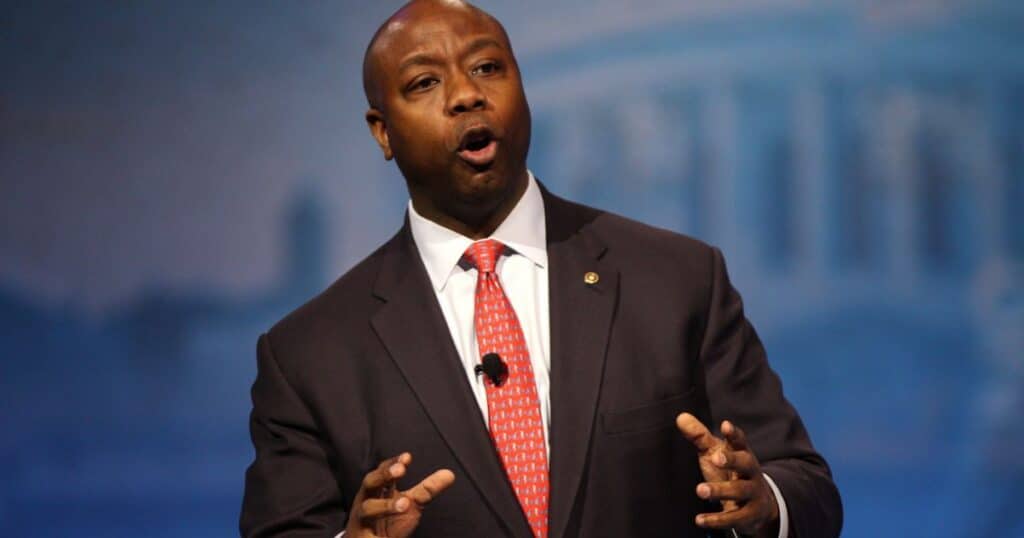Tim Scott has decided to take a chance and is running for the 2024 presidential election. He has been a Senator of South Carolina since 2013, and spent time in the House of Representatives before that. He has taken a strict stance on cannabis legalization, shown through his opposition to the SAFE Banking Act and federal legalization.
Read more at the link below.
https://vote.norml.org/politicians/11940
https://www.ontheissues.org/Domestic/Tim_Scott_Drugs.htm
Tim Scott has entered the race for the 2024 presidential election. Scott spent time as a Charleston City Council member and moved into the South Carolina General Assembly from 2009 to 2011. He then joined the House of Representatives from 2011-2013 before he gained his position as senator which he still holds. Scott has expressed concerns about cannabis legalization, but has not made it a focal point for his election campaign. He has focused more on the fentanyl crisis and border policy, often tying in his opinion on these issues into his public statements on cannabis policy. He has also expressed concerns about health risks associated with cannabis use and its potential for abuse.
“In my home state of South Carolina, marijuana is largely still illegal, and I, myself, have concerns with it.”
With that said, Tim Scott has not made many public statements around his opinion on cannabis, but there is evidence that shows he is generally not accepting of cannabis legalization.
Impact on Legislation
Tim Scott’s stance on the issue of state vs. federal rights regarding cannabis legalization has evolved over the years, showing a mix of views. In 2011, he made a statement that emphasized his support for preserving states’ rights, indicating a preference for allowing individual states to make their own decisions regarding cannabis policy.
However, his voting record in 2012 presented a somewhat contrasting perspective. During his time in the House, Senator Scott voted against a 2012 spending bill that sought to protect state medical cannabis programs from federal interference. This vote suggests a more cautious approach when it comes to the federal government’s role in regulating cannabis, even in states where it is legal for medical purposes.
Since 2012, Senator Scott’s position on states’ rights to legalize cannabis has not been as clearly articulated.
Banking For Everyone, Except Cannabis
Recently, his perspective on financial institutions’ role in supporting legal industries, including cannabis, came to the forefront during a Senate Banking Committee hearing in May 2023. At this hearing, Senator Scott underscored the critical importance of addressing this issue, and emphasized that while there may be benefits, he believes there are negative impacts that need to be addressed. Drawing from his experience as a former small business owner, he stated,
“And as a former small business owner, I understand and appreciate the importance of having that relationship with your financial institution. A banking relationship is crucial to providing safety and stability for a company – both employees and the customers it serves.” His opinion on safe banking for cannabis, however, is quite different. Scott showed strict opposition to the SAFE Banking Act, citing statements from the Department of Justice that state that this banking act would make it harder to catch criminals. While this issue has gained bipartisan support, he clearly stated,
“There are Republicans who’ve come out very positively on behalf of the SAFE Act. I’m not one of those Republicans…”
Furthermore, Senator Scott used this as an opportunity to express concerns about certain financial institutions succumbing to political pressures and actions, resulting in the practice of “de-banking” legal industries, such as oil, gas, and firearms.
Tim Scott’s Presidential Campaign and the Cannabis Conundrum
In conclusion, as the race for the 2024 presidential election closes in, Tim Scott’s position on cannabis legalization has left many questions unanswered. While he has not made cannabis a central focus of his campaign or elaborated fully, his past statements and voting history suggest a cautious and somewhat skeptical stance toward the federal government’s role in regulating cannabis, particularly in states where it is legalized.
Scott’s concerns about health risks, potential for abuse, and the impact of cannabis legalization on states’ rights have influenced his views on this issue. His recent opposition to the SAFE Banking Act, which has gained bipartisan support, underscores his reservations about federal involvement in the cannabis industry.
While Scott has demonstrated a strong commitment to preserving the financial stability of legal industries, his stance on safe banking for cannabis remains distinctly different from his support for other sectors. As the presidential campaign progresses, it will be interesting to see how Senator Scott’s evolving perspective on cannabis policy interacts with other prominent issues such as the fentanyl crisis and border policy. Ultimately, his position on cannabis legalization may continue to shape his policy approach and resonate with voters concerned about the intersection of federal and state authority in this complex policy landscape.
Featured Image courtesy of Gage Skidmore Flickr
About the Author
This is the sixth article in the series written by Michael Mattingly. @tripektah

Michael has a background in cannabis education and grew up in a family with roots in the industry. When he was Director of Events at Cannaclub UCLA he had the chance to learn from the industry and educate the student body on various aspects of the industry and the plant’s medical benefits.
Enjoyed that first hit? Come chill with us every week at the Friday Sesh for a freshly packed bowl of the week’s best cannabis news!





















